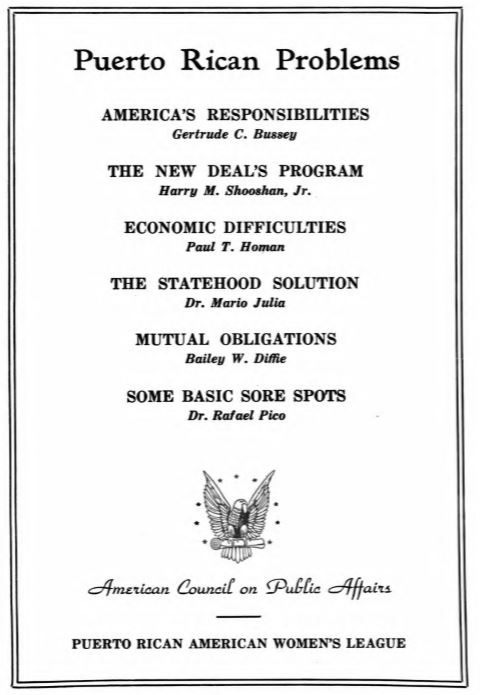1944: "Operation Bootstrap" Encourages Migration
 |
|
Authored by the Puerto Rican American Women's League, published in 1940 by the American Council on Public Affairs. Book from the Historical Society of Pennsylvania |
In the mid-1940s, the U.S. economy needed a boost. World War II and the attack on Pearl Harbor consumed the country’s resources. Federal programs modeled after Franklin Delano Roosevelt’s initiatives created to help the country recover from the Great Depression of the 1930s were utilized to stimulate individual U.S. industries. It was during this time that the federal government, in conjunction with Governor Luis Munoz Marin, pushed for the industrialization and development of the island of Puerto Rico.
Farming had been the primary economic venture in Puerto Rico for decades, but agriculture was no longer sustaining the island. Governor Marin, with the help of the U.S. federal government, initiated Operation Bootstrap in 1944 in order to transform Puerto Rico into a developed, industrialist economy. One of the movements of Operation Bootstrap occurred in May of 1947, when the first Industrial Incentives Act eliminated the Puerto Rican corporate tax. This encouraged United States manufacturing companies to establish factories on the island, as they would no longer be required to pay the corporate tax there.
Operation Bootstrap was a long-term project. In 1940, Puerto Rico’s net income from manufacturing was $27 million; in 1964, this number had grown to $486 million. The initiative was considered a success. Despite this development occurring in Puerto Rico, hundreds of thousands of Puerto Ricans took to air and sea to settle in cities along the East Coats of the continental U.S. With the aid of provisions from the initiative, Puerto Ricans left for new opportunities. Some individuals sought industrial jobs in the city emptied by the draft while others decided to engage in farm work in the continental U.S.
Written by Veronica Stickelman, a Documentary Producer and long time Philadelphia resident with an education and keen interest in the social sciences.
See the Spanish version of this page here.
For more context on this event, see the Politics page.
